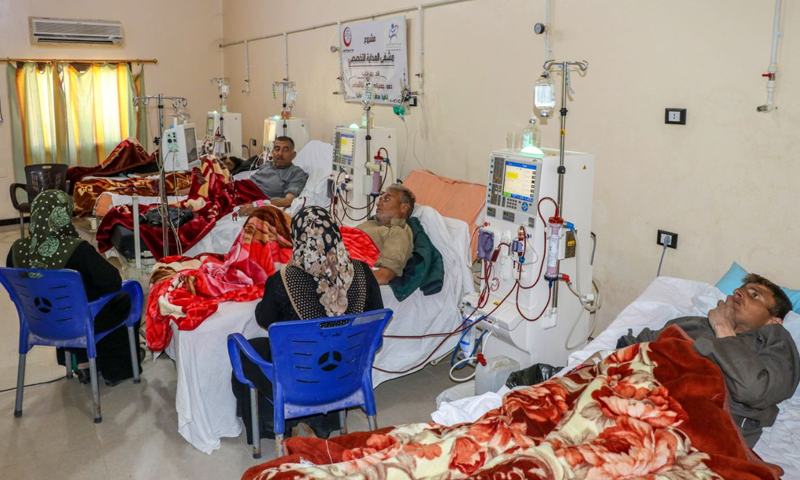Enab Baladi – Idlib
The chances of Idlib’s locals in enjoying security and stability have shrunk, as they are daily forced to fit into the overcrowded camps in the north, which are lacking adequate support compared to its inhabitants’ needs. Consequently, the health sector in the region is facing constantly increasing pressure.
Medical centers in northern Idlib are burdened by major pressures, the administrative director of the Ataa Residential Compound dispensary, located in Atme area, Nidhal Ar’our, told Enab Baladi, adding that despite the arrival of new waves of displaced persons to the region, the aid directed to the health sector has not increased. Thus, some hospitals’ share of funds in the northern region was interrupted.
Increasing needs without being met
Ar’our indicated that in addition to the shortage of medical personnel, specialists, and medications, none of the already existing centers have been expanded, indicating that patients had to wait for long hours to see the doctors. Thus, many appointments are constantly postponed.
According to the Idlib Health Directorate, international support for medical centers decreased by 40 percent in 2019 compared to 2018. The head of the media department in the directorate, Imad Zahran, told Enab Baladi that the Idlib Health Directorate was seeking to secure support for clinics and medical necessities. However, the directorate’s call for help did not receive any response.”
The humanitarian assessment of the area’s condition, conducted by the United Nations Office for the Coordination of Humanitarian Affairs (OCHA), stated that humanitarian organizations are increasing their response in the areas, which received new waves of displaced persons. However, the large increase in the number of displaced Syrians, in addition to the already existing needs, augmented northern Syria’s need for support.
Respiratory diseases accompany the winter and displacement conditions
Ar’our asserted that during the winter, Syrians catch more upper and lower respiratory tract diseases. As such, the number of patients, especially children, women, and the elderly, doubles.
New arrivals suffer from higher rates of infectious diseases, as most of them have no choice but to share tents with other families, which increases the spread of diseases. The United Nations recorded between 15 and 31 December 2019, 15,671 new cases of flu and 8338 cases of diarrhea.
With the lack of traditional heating methods, such as diesel and firewood, which are very pricey, the situation has got even worse. Thus, many displaced Syrians, according to Ar’our, resorted to cheaper alternatives, such as oil, charcoal, plastic materials and used clothes, which emit toxic gases and gravely affect the respiratory system, especially for children and asthma patients.
109 medical centers are still operating in northwest Syria. Hence, the shortage of clean water and the lack of a safe sanitation system are among the reasons behind the increasing transmission of infectious diseases, according to the OCHA report, which indicated that many of the clinics located in northern Idlib have reached their maximum capacity, while other centers extended their working hours to keep pace with the needs of the newcomers.
Specialized Hospitals: a major necessity and a serious deficiency
Specialized hospitals are considered as one main necessity in north-western Syria, according to the OCHA’s assessment, with a shortage of staff and equipment to fight the spread of infectious diseases. Hence, the report also referred to the vitality of increasing the funds allocated to mobile clinics, especially with regard to chronic diseases.
The lack of specialized hospitals represents a danger to the lives of patients with certain diseases, such as patients suffering from kidney failure, who need dialysis at least twice a week. Malek Bakar, information officer at Al-Hidaya Specialist Hospital in Qah town on the Syrian-Turkish border, told Enab Baladi that the number of patients with kidney failure, received by the hospital, has doubled, which raises concerns about the possibility of falling short of dialysis equipment, and, thus, risking the lives of patients.
In a step to increase the number of specialized hospitals, the Idlib Health Directorate announced, on January 8, the inauguration of the consultative clinic for cardiac surgery in the Al-Hidaya Specialized Hospital, referring to this new facility as an “ambitious” project to equip a general center for cardiac surgery, which would be “the first of its kind in northern Syria.” The center will include several departments, namely, the cardiac surgery clinic, an operation room, a six-bed intensive care unit, and a ten-bed hospitalization unit.
The Idlib health directorate stated that the goal of opening the medical center is to heal the suffering of the population in northern Syria and reduce the number of transferred patients to Turkish hospitals and areas under the regime’s control, while expecting that the new clinic will cover the needs of 80 percent of patients, who will not have to be referred to the Turkish hospitals, for free. Thus, Bakar added that the implementation of the project has already started.
According to the OCHA’s report, 312,000 people, 80 percent of whom are children and women, had been displaced starting from the beginning of December 2019 until January 8. Thus, the city of Maarat al-Numan, and its countryside, has become almost empty. Additionally, thousands of civilians have left Saraqib, in the southern countryside of Idlib, as a result of the military escalation carried out by the Syrian regime and its Russian ally.

